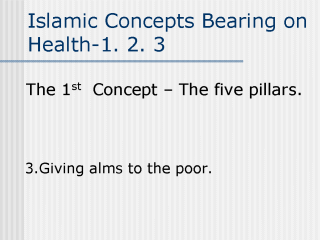| front |1 |2 |3 |4 |5 |6 |7 |8 |9 |10 |11 |12 |13 |14 |15 |16 |17 |18 |19 |20 |21 |22 |23 |24 |25 |26 |review |
 |
“Paying
alms-Obligatory ‘Zakat’” from ones wealth forms the third pillar within this
concept. Like the preceding pillar, alms giving has a set of guidelines outlined in the
Quran and ahadith (Quran 2:110,177; 3:186; 4:37; 5:12,55 etc; Sahih Bukhari Volume 2 Book
24, No 484- 578 & Book 25, No 579-588, Sahih Muslim Book 5, Chapter 1 to 20). Each
Muslim is obliged to spend a part of his wealth every year in charity to recipients that
include the needy, poor, wayfarers and to orphans amongst others (Quran 2:177; 9:60;
30:38; 70:25; Sahih Bukhari Volume 2 Book 24, No 484- 578 & Book 25, No 579-588, Sahih
Muslim Book 5, Chapter 1 to 20). In placing this pillar on the continuum of health it
would be more in the middle, as its impact on health is more felt at the community level
when looked at from the point of the giver of alms. Its link lies in its provision of
enabling factors through the setting up of an obligatory mechanism for all Muslims to
share in their wealth. This sharing mechanism obviously provides an environment, which
encourages wealth redistribution and so fosters the reduction of inequities to a certain
extent in a community. The Quran is abundant with verses encouraging wealth redistribution
or spending for the sake of Allah by setting obligatory measures for these but also by
stating the virtues of spending ones wealth to benefit those in need. This encouragement
has given birth to the concept of Waqf and Saddaqa amongst others, which are forms of
financial and material endowments from able Muslims that are meant to benefit those who
are needy or the general good of the community. These two concepts (waqf and Saddaqa) are
not obligatory but are widely encouraged in the Quran (Quran 2:188,215,254,261,279; 3:14;
4:2,5,6,20,21,29,30,32,37,161; 5:62; 8:28, 9:24,34,55,85 etc) In comparing the third pillar to what was stated in the Ottawa Charter (WHO, 1986) it fits within the description of the action point of building healthy public policy which states “Health promotion policy combines diverse but complementary approaches including legislation, fiscal measures, taxation and organizational change. It is coordinated action that leads to health, income and social policies that foster greater equity. Joint action contributes to ensuring safer and healthier goods and services, healthier public services, and cleaner, more enjoyable environments” De Leeuw and Hussein (1999) in illustrating the ‘Islamic Charter’ links this action point to the Islamic concept of Waqf, which as mentioned earlier is a form of Islamic financing in support of community activities. They have also linked the Waqf concept to the Ottawa Charter action point “reorienting health services”. The Ottawa charter action point Strengthen community action, which states “Community development draws on existing human and material resources in the community to enhance self-help and social support, and to develop flexible systems for strengthening public participation in and direction of health matters. This requires full and continuous access to information, learning opportunities for health, as well as funding support”, with its implication on community role in the enhancement of self-help, social support and as well as funding support, there is also a link which as well fits within this Islamic pillar of alms giving. Reference: De Leeuw, E. & Hussein, A. (1999). Islamic health promotion and interculturalization. Health Promotion International, Volume 14 No 4, 347-353. Khan M. M.(2001). Sahih Bukhari Translation. Muslim Student Association, University of Southern California. Web site Siddiqui, A. (2001). Sahih Muslim Translation. Muslim Student Association, University of Southern California Web site |
| front |1 |2 |3 |4 |5 |6 |7 |8 |9 |10 |11 |12 |13 |14 |15 |16 |17 |18 |19 |20 |21 |22 |23 |24 |25 |26 |review |